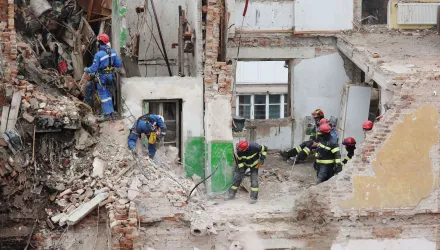Georgia?s non-violent, popular uprising after the regime?s brazen attempt to sway the parliamentary elections of 2 November 2003, and Eduard Shevardnadze?s acquiescence to the public will were striking and inspiring. Despite the widespread support for the regime change, the new leaders face significant challenges in consolidating their power and transforming state organs into effective and legitimate institutions for most Georgian citizens. This dramatic turn of events also has significant regional and international implications.
The Republic of Georgia, despite its lack of economic resources and small population, has strategic geopolitical significance ? by virtue of its location, the republic is afforded control of transport lines to the entire southern Caucasus and Central Asia. Georgia is likely to become an important transit state of major export pipelines of Caspian oil and gas ? the Baku-Tbilisi-Ceyhan oil pipeline and the Baku-Tbilisi-Erzerum gas pipeline.
Moreover, the Caucasus is frequently a point of transit for the United States military and other flights supporting operations in Afghanistan, Iraq, and other destinations in the Middle East. In addition, the US deployed its first military forces in the Caucasus with the introduction of the Georgia Train and Equip Program (GTEP) in April 2002 to enable Tbilisi to secure its borders and contribute to the war against terrorism.
Over the past decade, significant US and European efforts have been focused on fostering democracy and stability in Georgia. The republic has received over $1.2 billion in US aid since it won independence from the Soviet Union in 1991. Despite these investments, the Georgian state has neither succeeded in delivering sufficient services to its public nor fostering economic well-being; the state has become neither democratic nor stable. Additionally, the central government does not control regions that are formally within its borders ? Abkhazia and South Ossetia. Moreover, the region of Adzharia is administered in a de facto confederation with Tbilisi. At the time of writing, Aslan Abashidze, Adzharia?s absolute ruler, has not recognised the new government in Tbilisi.
Before the parliamentary elections, the main oppositional forces did not coalesce into a political alliance and ran on separate tickets. Following the elections, they united to conduct the public protest against Shevardnadze?s government. Now that they have the keys to the president?s office and the parliament, they have functioned well, but it is not clear that they will continue to succeed to work as a coalition.
Despite the focus of their public campaign having been the fairness of the parliamentary elections, the new leaders have failed to commit to a date for new parliamentary elections. They have stated that they will conduct presidential elections first ? on 4 January 2004 ? and then organise parliamentary elections, a sequence that could hurt their public legitimacy.
The non-violent outcome of the confrontation between the demonstrators and the government, coupled with Shevardnadze?s decision to resign, emphasise how crucial effective governmental security branches are. During the crisis, the defence minister and other leaders of security forces clarified to Shevardnadze that they did not plan to use force to defend his rule, and this clearly determined the outcome. Control and successful functioning of the security branches will be essential to the success of the new government, but this factor still remains problematic in Georgia, where the police and other security forces are often one of the threats that citizens face. To govern successfully, the new leaders need gradually to improve the behaviour of the security forces, without undermining their ability to keep minimum order in the state.
The change in leadership does not represent a shift in foreign policy orientation. As in neighbouring Azerbaijan, both the opposition and the ruling regimes share a pro-US foreign policy. However, the last month of crisis has reminded the Georgians of the centrality of Russia to developments in the region. One of the first steps of the new leaders in Tbilisi was to articulate the desire to mend fences with Moscow and develop a more constructive relationship. On the positive side, the United States and Russia no longer conduct a zero-sum relationship in the southern Caucasus, and it is possible to craft a policy of constructive relations with both Moscow and Washington.
The Baku-Tbilisi-Ceyhan and Baku-Tbilisi-Erzerum pipeline projects will most likely not be significantly hampered by the change in government. The new government enthusiastically supports these projects as well and they are viewed by most in Georgia as their only hope to generate income at this stage for the impoverished republic. But the perception of instability can negatively affect the entire region?s foreign investment climate.
The events in Georgia have compelled the US government and other states and international organisations to begin to rethink some of their policies in the Caucasus. Despite considerable US investment, Georgia achieved neither democracy nor prosperity, and Washington is looking to craft new policies for more effective use of the resources expended in the area.
The volatility of the situation in Georgia should serve as a vivid reminder of the need for proactive diplomacy to resolve the conflicts of the Caucasus and enhance regional stability. Armenia and Azerbaijan?s lingering Nagorno-Karabagh conflict could re-ignite next ? but a constructive approach could also defuse and resolve it.
The Caucasus is a crossroads for more than energy pipelines, and the international community has a vested interest in its security, stability, and prosperity. However, these elements are interlinked, and the international community should engage in conflict resolution in the region to ensure the success of the economic projects as well as to protect the security of the citizens of the region.
The full text of this publication is available via Open Democracy.


